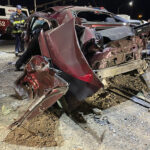The California Court of Appeal began and ended its insurance coverage opinion of March 7, 2018 with the Bard’s wisdom. The court clearly got it right in denying property insurance coverage for the victim of counterfeit wine sales, and it cushioned the blow to the policyholder – somewhat — with a second quotation from “Othello”. The case is Doyle v. Fireman’s Fund Ins. Co., reported at 2018 Cal. App. LEXIS 187.
Here are the facts relevant to the insurance dispute: The policyholder, David Doyle, was a collector of rare, vintage wines that he stored in a wine facility located in Laguna Beach, California. He claimed to have assembled what he termed a “world-class” collection of wines. In an attempt to protect himself from loss or damage to his wine collection, Doyle purchased a property insurance policy from Fireman’s Fund. The coverage he purchased was titled “Valuable Possessions” insurance, and it had a blanket policy limit of $19 million. Doyle first purchased the coverage in 2007, and he renewed the annual coverage eight times.
While he was so insured, Doyle purchased from one Rudy Kurniawan (birth name Zhen Wang Huang) almost $18 million of what Doyle believed was rare, valuable vintage wine. Kurniawan turned out to be a perpetrator of wine fraud. He was the first person in the United States to be convicted of wine fraud. During the 10-year period from 2002 two 2012, when he was arrested, Kurniawan is estimated to have sold as much is $150 million of counterfeit wine in bottles bearing counterfeit labels, according to Maureen Downey, a fine wine authentication expert and founder of Chai Consulting, all as reported by Bianca Bosker in the October 14, 2016 edition of the New Yorker. Worse, as much as $550 million worth of counterfeit “fine wine” may still be in the market, according to Downey, as reported by Patrick Schmitt on December 8, 2016 at The Drinks Business, a monthly international B2B magazine and website, published by Union Press.
Kurniawan was convicted of fraud in 2013 and imprisoned for 10 years.
Back to the insurance aspects of this saga. Policyholder Doyle made an insurance claim asking for reimbursement from Fireman’s Fund under his “Valuable Possessions” insurance for losses he claimed to have suffered because of Kurniawan’s fraud perpetrated on him. Fireman’s Fund investigated the claim and denied it on the grounds that there were no covered losses under the policies. Doyle filed suit against Fireman’s Fund claiming it had breached the insurance policy contracts. The trial court dismissed Doyle’s lawsuit, entering judgment in favor of Fireman’s Fund. Doyle appealed to the California Court of Appeal. (The parties settled a claim by Doyle based upon the theory that the parties, in making their insurance contracts, had each made a mistake of fact as to the value of the wine insured, resulting in an overpayment of insurance premiums.)
The Court of Appeal affirmed the trial court’s judgment of dismissal. In the process, the court capsulized the cause of Doyle’s loss in Shakespearean language: “O thou invisible spirit of wine, if thou hast no name to be known by, let us call thee devil!” (“Othello”, act II, scene 3.) The court added: “Yea verily, we are presented with a most unfortunate tale of a villainous wine dealer who sold millions of dollars’ worth of counterfeit wine to an unsuspecting wine collector.”
Doyle’s contention in favor of coverage for his claim was that his “Valuable Possessions” property insurance policy provided broad protection against all insurable risks, which he argued included crime-related losses to his investment, whether anything physical happened to the wine or not. Fireman’s Fund’s counter argument was that no “loss or damage to covered property” had occurred, as the policy required, because the wine was in the exact same physical condition after the loss was discovered that it was in when Doyle first insured it.
The key to the court’s decision for Fireman’s fund was the “PERILS INSURED AGAINST” provision of Doyle’s “Scheduled Valuable Possessions Policy,” which read, “We insure for direct and accidental loss or damage to covered property caused by an ‘occurrence.'” (Emphasis added.) The policy defined “occurrence” as “a loss to covered property which occurs during the policy period and is caused by one or more perils we insure against.” The policy did not define the term “loss.”
The policy was quite specific in naming items of valuable personal property that were covered, such as jewelry, furs and fine art. Wine was covered in category of “Collectibles,” which besides wine, included “sports cards, calls, model trains, and other private collections of rare, unique or novel items of personal interest including memorabilia.”
The exceptions from coverage found in the policy supported the Fireman’s Fund argument by excluding conditions inherent in the property insured, either before coverage attaches, or afterwards. That portion of the policy excluded loss caused by “wear and tear, gradual deterioration, latent defect or inherent vice[.]” With regard to coverage for wine, the policy said, “if wine is covered…, the following exclusions also apply: a. Failure to use reasonable care to maintain all heating, cooling or humidity control equipment improper operating condition…; b. Improper handling or storage; c. Consumption; or d. Normal shortage, leakage, spillage, evaporation, dissipation, spoilage or deterioration, all usual and customary to wine.”
The court was not writing upon a blank slate. It relied primarily upon the decision in Simon Marketing, Inc. v. Gulf Ins. Co. (2007) 149 Cal. App. 616, 622-623. In that case, a marketing company, Simon, designed promotional games for McDonald’s Corporation and its franchisees, including “Who Wants to Be a Millionaire” and “Monopoly.” An employee of the marketing company, one Jacobson, stole winning paper game pieces with a total redemption value of approximately $21 million by organizing a network of accomplices and co-conspirators to channel high-value winning game tickets to specific individuals, who paid Jacobson kickbacks. Jacobson was arrested along with others by the FBI in August 2001, ultimately pleading guilty and sentenced to prison. In discovery, Simon stated unequivocally that it was not seeking reimbursement for the value of the pieces of paper that constituted the winning game pieces. Rather, Simon argued that the undisputed facts established that the theft of the McDonald’s game pieces from Simon’s possession by its employee was a “direct loss” of covered property, because McDonald’s and other customers of Simon canceled their contracts with Simon.
The two insurance policies covering Simon provided that the insurer would pay for loss of, and loss from damage to, Covered Property resulting directly from the Covered Cause of Loss….” In finding no coverage for Simon’s financial loss due to the criminal scheme, the court stated, in a passage quoted by the Doyle court, “Property insurance is a type of insurance with its own historical development, and which is now available to cover ‘just about any type of property that exists in the modern world.’ … And the self-evident point is that property insurance is insurance of property. While in the modern setting ‘just about any type of property’ may be insured, the insured item must nonetheless be property. Given this premise, the threshold requirement for recovery under the contract of property insurance is that the insured property has sustained physical loss or damage. ‘The requirement that the loss be “physical,” given the ordinary definition of that term is widely held to exclude alleged losses that are intangible or incorporeal, and, thereby, to preclude any claim against the property insurer where the insured merely suffers a detrimental economic impact unaccompanied by a distinct, demonstrable, physical alteration property. Under the foregoing test, it becomes apparent that the termination of Simon’s business because McDonald’s and others canceled their contracts with Simon is not the physical loss, or damage, to insured property.” (Simon, pp. 622-623, quoting 10A Couch on Insurance, §148:46, p. 148-81.)
Applying Simon’s teaching to the Doyle claim, the Court of Appeal in Doyle found that the policyholder had not stated a cause of action for breach of the insurance policies in issue, because nothing happened to the covered property, the wine that Doyle purchased and insured. The plain language of the “PERILS INSURED AGAINST” policy provision, the court said, “makes it clear that Fireman’s Fund was insuring [Doyle] against ‘direct and accidental loss… to covered property[.]” “The word ‘loss,'” the court said, modifies the subject [actually object] phrase ‘covered property’ by way of the preposition ‘to.’ Fireman’s Fund was not insuring against any losses to Doyle’s finances or to his unrealized expectations as to the value of the wine he had purchased.” (Emphasis by Doyle court.) The Doyle court cited also to California Fair Plan Assn. v. Garnes (2017) 11 Cal. App. 5th 1276, 1288-1289, holding that “the phrase ‘total loss to a structure’ in a fire insurance statute ‘unmistakably contemplates a quantum of physical damage . . . and excludes the sort of economic analysis employed by’ the [insurer].”
Summarizing, the Court of Appeal in Doyle pointed out that “when Doyle purchased the wine from Kurniawan it was counterfeit. The wine remained counterfeit (and essentially worthless) throughout the entire coverage period of [each policy].” Further, “Doyle’s financial loss was not a covered peril, it is simply a measure of his damages.… Doyle did not buy a provenance insurance policy; Doyle bought a property insurance policy.” (Emphasis by Doyle court.)
Returning to a Shakespearean mode for its finale, the court said, “Finally, we can merely offereth to Doyle this small piece of wisdom from the Bard of Avon: ‘The robbed that smiles steals something from the thief.’ (Shakespeare, “Othello”, act I, scene 3.)”
Was this article valuable?
Here are more articles you may enjoy.


 Report: Vehicle Complexity, Labor ‘Reshaping’ Auto Insurance and Collision Repair
Report: Vehicle Complexity, Labor ‘Reshaping’ Auto Insurance and Collision Repair  Poll: Consumers OK with AI in P/C Insurance, but Not So Much for Claims and Underwriting
Poll: Consumers OK with AI in P/C Insurance, but Not So Much for Claims and Underwriting  Justice Department Preparing Ticketmaster Antitrust Lawsuit
Justice Department Preparing Ticketmaster Antitrust Lawsuit  Johnson Controls Unit to Pay $750M to Settle ‘Forever Chemicals’ Lawsuit
Johnson Controls Unit to Pay $750M to Settle ‘Forever Chemicals’ Lawsuit 